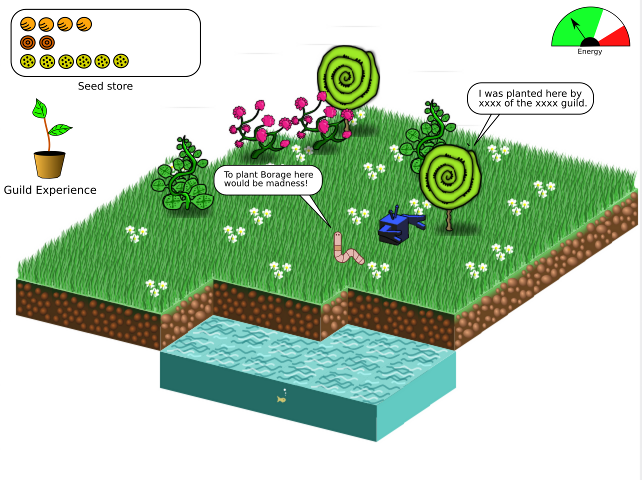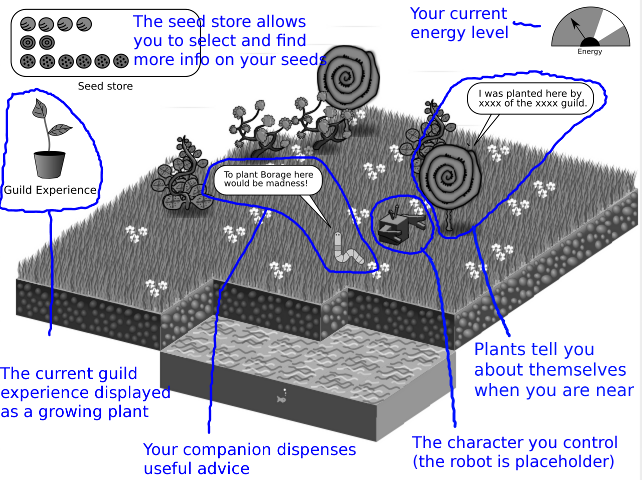Table of Contents
Germination X
This is an initial game design for Germination X - a permaculture game for social networking platforms.
Current pre-alpha version running here: http://t0.fo.am:8000
Games for reference
- Living Landscapes card game - permaculture game http://www.mimoo.madeit.com.au/detail.asp?id=92476
- Wildcraft, a herbal adventure board game http://www.learningherbs.com/wildcraft.html
Serious games that deal with farming and food production:
- McDonalds parody http://www.mcvideogame.com/
- Permaculture Elements: http://www.seed.org.za/game.php
- Food Force (by the World Food Programme) http://www.wfp.org/how-to-help/individuals/food-force
- 3rd World Farmer http://www.3rdworldfarmer.com/
- A Swine Production Training Simulation: http://www.forgefx.com/casestudies/virtual-pig/pig-farm-training-simulator.htm
General ideas
- You can sew seeds and see other players plants.
- The plants will grow according to a simulation model based on companion planting.
- You have a planting guide companion who follows you around to guide you. See germinationx companion.
- Players never directly meet in the game - although they will be aware of each other's activity and be able to share simple messages and seeds.
- The world is large and you can freely explore, but you can only see a small portion of it at a time.
- The plants will consist of local, interesting or on the edge of extinction species as well as well known types.
Game Sketch
Social Elements
One of the most interesting aspects is to explore the community building effects of social games. The main way this will work will be through the world, which is an open and shared space, unlike other facebook games which give you a private owned area which you manage, and limited access to your friend's spaces.
Some ideas for more specific additions:
Organic approach
- Players are notified when they have helped one another with good choice of planting locations.
- This will apply to all players, not only players on your friends list - new contacts can be made.
- They can send helpful items, such as seeds in return for your help. Perhaps also messages, but maybe from a menu of preset phrases, or some other form of communication (picking flowers or …).
- Players are given detailed information on their (FB) friend's plants and can therefore choose to help (or hinder?) one another.
It would also be good (if optimistic) to consider the possibility of creating a system open enough for players to create their own economies or markets of exchange, rather than build one in.
Player Guilds
Seems rigid and encouraging a collection-as-linear-progress game mechanic, but another option:
- Players are arranged into “gardener guilds”.
- New players can join guilds or start their own.
- Player guilds have experience points.
- You increase your guild's experience points by growing successful plants, listening to your companion is essential to do this well.
- The more experience points your guild has, the more diverse types of seeds you will able to collect, seeds will appear on plants that are more difficult to grow.
This also encourages competition amongst guilds.
Pattern of play
See the germinationx user stories.
Permaculture companion
You will be aided in your planting by a companion who can help point out good areas to plant your seeds in, and explain why, based on the permaculture system below. The role of the companion will be to explain permaculture through the game.
It would be interesting to use a social network platform for experimentation and collecting feedback from the public. Players might be able to choose from a selection of companion types, or have them randomly assigned.
The relationship of the player with the companion should be a focus for testing. The companion could follow the model of the companion character Yorda in the Ico game, slower and needing attention from the player in some way. This way the companion will require a little investment of time - even if it's just waiting for it to catch up. I'd like to explore whether this actually increases feelings of attachment - especially if it's use to you and knowledge are not clear to begin with and are gradually revealed.
Possible companion forms:
- An insect.
- A wise old man/woman.
- A plant - could everything in the game be depicted in a vegetal form?
- Control - no companion, but the same information dispensed in “tool tip” like form.
Permaculture system
Plants in the game will grow according to simplified permaculture and companion planting rules. As well as players, plants are also arranged into guilds, of mutually beneficial plants. The companion will teach you which plants are suitable for planting together and why - this will be based on real life examples. In companion planting, each plant has something it offers (a function) and also something it needs (a weakness). For example, an extremely simple plant guild could consist of:
| Plant | Function | Weakness |
|---|---|---|
| Pea | N2 fixer | Pests |
| Turnip | Repels pests | Susceptible to weather damage |
| Apple tree | Provides shelter | Requires N2 |
In this way each plant benefits from close proximity to the other, and forms a loop of dependency. Not sure if this particular example is accurate - it's very important that we use real examples.
Pea needs → Apple tree needs → Turnip needs → Pea
More plants may form complex relationships, but we don't need much more complexity to get the point across. So, areas planted out of balance will be susceptible to the plant's weaknesses, eg an area dominated by peas:
| P | P | T | P |
| P | P | P | P |
| P | T | P | P |
| P | P | P | A |
Will be decimated by pests, while an area lacking shelter would become damaged by harsh weather eg:
| T | A | T | P |
| P | P | P | P |
| P | T | T | T |
| P | P | P | T |
A more suitable pattern would be to mix them up more thoroughly:
| P | T | A | P |
| A | P | T | A |
| T | T | A | P |
| P | A | A | T |
Regions
The world is separated into regions (temperate, arctic, arid, mountainous, tropical). As your guild's experience increases, you can explore further and grow plants in multiple regions. Regions will have corresponding weather conditions, and pests.
Players living in different regions will be able to give us feedback on growing conditions and ideas for new plants and recipes.
Weekly year seasons
The growing season will be sped up into a week.
- Sat, Sun: Winter, some harvesting of root crops.
- Mon, Tue, Wed: Spring/Summer, time to plant.
- Wed Thu, Fri: Summer/Autumn, harvesting time.
Perhaps these need to be shifted around to suit the average working week! Growing conditions will vary in time as well as space - affected by weather.
Boskoi connection
Needs much more thought, and a closer look at the project from my point of view, but some ideas:
- Plants discovered during foraging expeditions result in additional seeds being made available to your gardener guild.
- Plants foraged in boskoi replenish your energy in the game.
- As your guild improves, so boskoi unlocks secret plants in your city.
Visual Design
Code repo
Road Map
Flash/HTML5 clientside isometric graphics engineLarge world navigation mechanichttp://www.pawfal.org/dave/live/wilderness/2/Persistent server process storing plant/world informationhttp://t0.fo.am:8000- Integration with facebook
- User model
- Permaculture rule system running on the server
- Data driven plant descriptions/sprites with permaculture roles/needs - also recipes for each!
Alpha testing: Seeing if the permaculture rules work for a simple system. Time now to iterate this until it's satisfactory. From this point on plants can be added in parallel to the development.
- Player guilds
- Player energy system
- First pass companion
- First pass boskoi/phone app integration
Beta testing: Concentrating on the companion and player/guild dynamics.
- Visualisation of pestilence and weather
- More companion types
- Seasons
- Adding more regions

